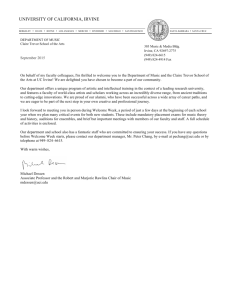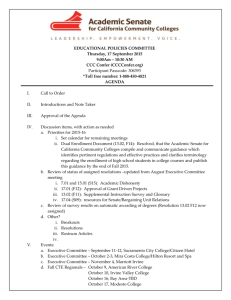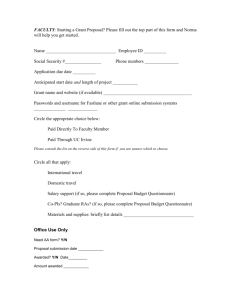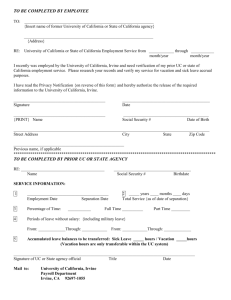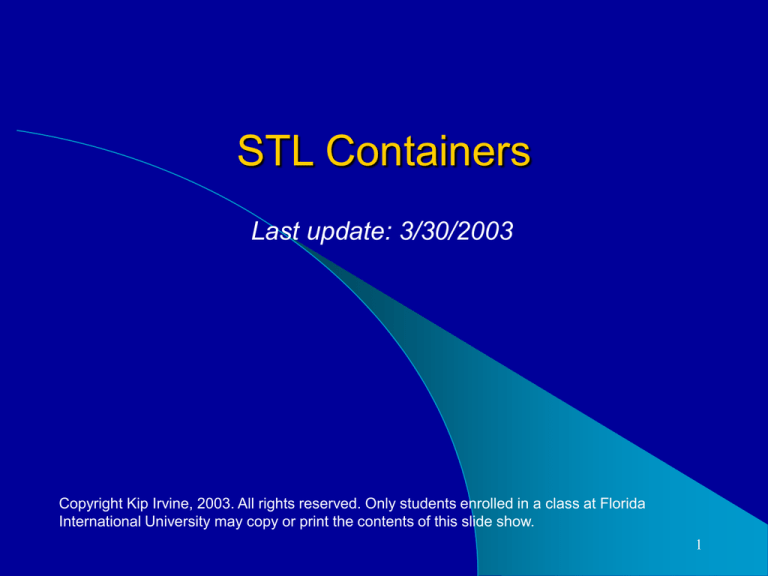
STL Containers
Last update: 3/30/2003
Copyright Kip Irvine, 2003. All rights reserved. Only students enrolled in a class at Florida
International University may copy or print the contents of this slide show.
1
Standard Template Library (STL)
Created by Alexander Stepanov and Meng Lee at
Hewlett-Packard
Key components: containers, iterators, algorithms
Helps you avoid having to re-invent standard
container implementation code
Design choice: generic classes chosen for runtime
efficiency
• more efficient than object-based containers that use
polymorphism
Copyright 2003, Kip R.Irvine
2
Standard Template Library (STL)
Recently incorporated into the Standard C++ Library
STL Programmers' Guide available at:
• http://www.sgi.com/tech/stl
• Latest release: 3.3, June 2000.
Copyright 2003, Kip R.Irvine
3
Types of Containers
Sequence containers
• vector
• deque
• list
Associative containers
• set, multiset
• map, multimap
Container adapters
• stack
• queue
• priority_queue
Copyright 2003, Kip R.Irvine
4
Required Headers
Class name same as header:
• <vector>, <list>, <deque>, <stack>, <bitset>
Also:
• <queue>
• <set>
• <map>
queue, priority_queue
set, multiset
map, multimap
Copyright 2003, Kip R.Irvine
5
Error Handling
Exceptions are never thrown by STL classes
In fact, exceptions and templates don't mix
Very little error checking exists in STL classes
Copyright 2003, Kip R.Irvine
6
Common Typedefs
value_type
• type of element stored in the container
reference, const_reference
• reference to type of element stored in the container
pointer
• pointer to the type of element stored in the container
iterator, const_iterator
• a forward iterator that points to the type of element stored in
the container
reverse_iterator, const_reverse_iterator
• a reverse iterator that points to the type of element stored in
the container
Copyright 2003, Kip R.Irvine
7
Common typedefs in STL
(cont)
difference_type
• type of the result of subtracting two iterators
size_type
• type used to count items in a container, and index through a
sequence container
Copyright 2003, Kip R.Irvine
8
Common Member Functions
default constructor, copy constructor, destructor
empty
max_size
• max number of elements for a container
size
• number of elements currently in the container
operator =
• assign one container to another
overloaded <, <=, >, >=, ==, !=
swap
Copyright 2003, Kip R.Irvine
9
Common Member Functions
begin
end
erase
clear
rbegin
rend
returns an iterator (-> first element)
returns an iterator (-> after last element)
erase 1 or more elements
erase all elements
returns reverse_iterator
returns reverse_iterator
Copyright 2003, Kip R.Irvine
10
Element Types for Containers
Must have correct copy semantics
• bitwise default, or
• overload the assignment ( = ) operator and copy
constructor
Provide operator < and operator ==
Copyright 2003, Kip R.Irvine
11
Types of Iterators
Input Iterator (InIt)
• Used to read an element from a container
• Moves only in forward direction, one element at a time
• Cannot pass through a sequence twice
Output Iterator (OutIt)
• Used to write an element to a container
• Moves only in forward direction, one element at a time
• Cannot pass through a sequence twice
Each iterator's capabilities are a superset of the previously listed
iterators.
Copyright 2003, Kip R.Irvine
12
Types of Iterators (cont)
Forward Iterator (FwdIt)
• reads and writes in forward direction only
• retains its position in the container
Bidirectional Iterator (BidIt)
• reads and writes in both directions
• retains its position in the container
Random-Access Iterator (RadIt)
• reads and writes in randomly accessed positions
• permits pointer arithmetic
Each iterator's capabilities are a superset of the previously listed
iterators.
Copyright 2003, Kip R.Irvine
13
Iterator Support, by Container
stack, queue, priority_queue:
list, set, multiset, map, multimap:
vector, deque:
Copyright 2003, Kip R.Irvine
no iterators
bidirectional
random
14
Invalidating Iterators
Some, but not all operations on containers invalidate
iterators
• result: iterator can be stale
• remember that iterators are basically pointers
Examples:
• list.push_back( ) does not invalidate iterators
• vector.push_back( ) invalidates all iterators
• list.erase( ) invalidates only iterators that pointed to the
deleted elements
• check the documentation for each method!
Copyright 2003, Kip R.Irvine
15
Sequence Containers
Copyright 2003, Kip R.Irvine
16
vector Container
sequence container with contiguous memory
locations
permits direct access to any member via [ ] or at( )
automatically doubles its allocation when current size
is exceeded
insertion and deletion only permitted at the tail
supports random-access iterators
• all lesser iterators also
Copyright 2003, Kip R.Irvine
17
Common vector Functions
push_back, pop_back
• add to end, remove from end
size
• current number of elements
capacity
• storage allocation size
begin, end
• return iterator and const_iterator
rbegin, rend
• return reverse_iterator and const_reverse_iterator
front, back
• return first and last elements
Copyright 2003, Kip R.Irvine
18
Common vector Functions
at( )
operator [ ]
(also found in deque)
Copyright 2003, Kip R.Irvine
19
list Sequence Container
efficient insertion and deletion at any location
• deque is more efficient if insertions and deletions are at the
ends of the container
implemented as doubly-linked list
• supports bidirectional iterators
does not support
• at( ) or operator [ ]
Copyright 2003, Kip R.Irvine
20
list Operations
operations not found in vectors:
void splice( iterator iter, list & X )
• removes values from list X and inserts them into the current
list in the position immediately before position iter
void push_front( const T & X )
• inserts element X at the front of the list
void pop_front( )
• removes one element from the front of the list
void remove( const T& x )
• removes all elements found to be equal to X
Copyright 2003, Kip R.Irvine
21
Unique list Operations
void unique()
Removes from the current list every element that is equal to its
preceding element
void merge( list & other )
Removes from the list other and insert them in sorted order into the
current list
void reverse()
Reverses the order of elements in the current list
void sort()
Sorts the list in ascending order by automatically calling the < operator
function to compare pairs of elements
void sort( greater<T> pred )
Sorts the list in descending order by automatically calling the < operator
function to compare pairs of elements
Copyright 2003, Kip R.Irvine
22
Creating a list
list<int> scores;
scores.push_back( 20 );
scores.push_front( 10 );
scores.pop_front( );
scores.remove( 20 );
// removes "20"
cout << "size: " << scores.size( ) << endl;
List of lists containing strings:
list< list<string> > L;
Disable Microsoft VS 6.0 warning message that appears when templates contain
strings:
#ifdef _DEBUG
#pragma warning( disable : 4786 )
#endif
Copyright 2003, Kip R.Irvine
23
Printing a list
template < class T >
void print( const list<T> & aList )
{
if ( aList.empty() )
cout << "List is empty";
else
{
list<T>::const_iterator I = aList.begin( );
for( ; I != aList.end( ); I++ )
cout << *I << ", ";
cout << endl;
}
}
Copyright 2003, Kip R.Irvine
24
Removing list Duplicates
list<int> scores;
scores.push_back(
scores.push_back(
scores.push_back(
scores.push_back(
scores.unique( );
print( scores );
10
20
30
30
);
);
);
);
// 10, 20, 30
Copyright 2003, Kip R.Irvine
25
List of Lists
typedef list<string> stringList;
stringList s;
s.push_back( "Dan" );
s.push_back( "Bill" );
s.push_back( "Anne" );
// a list containing lists of strings
list<stringList> L;
L.push_back( s );
Copyright 2003, Kip R.Irvine
26
Associative Containers
Copyright 2003, Kip R.Irvine
27
Associative Containers
keys are always kept in sorted order
• iterator always traverses in sort order
set – single key values
• equivalent to Java's TreeSet
multiset – duplicate keys allowed
map – contains pairs (key, value)
• key is unique
• equivalent to Java's TreeMap
multimap
• key need not be unique
Copyright 2003, Kip R.Irvine
28
Sets: Three Ways to Insert Items
insert single value, returning an iterator
iterator insert( const value_type & x);
start searching for insert point after iterator it:
iterator insert( iterator it,
const value_type & x );
insert sequence of elements in the range [first, last):
void insert( const value_type * first,
const value_type * last );
Copyright 2003, Kip R.Irvine
29
Examples: Inserting and Finding
Create a multiset and insert single values:
multiset<int> B;
B.insert( 30 );
B.insert( 20 );
Insert an array:
const int SIZE = 5;
int array1[SIZE] = { 10,20,30,30,40 };
B.insert( array1, array1 + SIZE );
Find a value:
multiset<int>::const_iterator I = B.find( 30 );
Copyright 2003, Kip R.Irvine
30
Using typedef
Use typedef to simplify type definitions:
typedef multiset<int> msetInt;
.
msetInt A;
typedef multiset<int>::const_iterator msetIter;
.
msetIter = A.insert( 30 );
Copyright 2003, Kip R.Irvine
31
Printing a Multiset
template < class T >
void print( const multiset<T> & aSet )
{
if ( aSet.empty() )
cout << "Set is empty";
else
{
multiset<T>::const_iterator I = aSet.begin( );
for( ; I != aSet.end( ); I++ )
cout << *I << ", ";
}
}
Copyright 2003, Kip R.Irvine
32
set Associative Container
keys are unique
• attempt to insert duplicate key is ignored
same functions as multiset
Copyright 2003, Kip R.Irvine
33
map Associative Container
unique keys and their associated values
each key is mapped to a single value
• values do not have to be unique
fast storage and retrieval
sorted in order according to keys
Iterators point to pair<key,value>
• fields named first, second
values can be inserted using [ ] operator
see: mapdemo.cpp
Copyright 2003, Kip R.Irvine
34
Function Objects
template class that contains a function
• the function can be used in the same way as operator ( )
make STL more flexible
• permit sorting on your own criteria
predefined objects in STL:
•
•
•
•
•
•
divides< T >
equal_to< T >
greater< T >
greater_equal< T >
less< T >
etc.
Copyright 2003, Kip R.Irvine
35
Function Object Example
Default comparison of STL container objects when
sorting uses the < operator:
template<typename T>
class less {
public:
bool operator()(const T & x, const T & y) const
{
return x < y;
}
};
Copyright 2003, Kip R.Irvine
36
Function Object Example
When you declare a set, you have the option of
specifying a function object that will determine the
positions where new elements are inserted.
Example: set of strings named myStringSet:
set<string, less<string> > myStringSet;
Copyright 2003, Kip R.Irvine
37
Binary Function Example
Base class binary_function defines overloaded ( )
operator with two arguments.
This function object squares a value and adds it to a
total:
template< typename T >
class SumSquaresClass :public binary_function<T, T, T>
{
public:
const T operator( )( const T & total, const T & value )
{
return total + value * value;
}
};
Copyright 2003, Kip R.Irvine
38
Binary Function Example
(cont)
accumulate( first, last, startVal, pred )
The STL defines an accumulate function that
accumulates a sum over a collection.
• the optional pred parameter can be a function or a function
object
vector<int> v;
. . .
int sum = accumulate( v.begin( ), v.end( ), 0,
SumSquaresClass<int>() );
Copyright 2003, Kip R.Irvine
39
Optional Information
Copyright 2003, Kip R.Irvine
40
deque sequence container
pronounced "deck"
provides benefits of vector and list in the same
container
•
•
•
•
•
rapid indexed access (like vector)
efficient insertion & deletion at its ends (like list)
supports random-access iterators
often used for FIFO queue
noncontiguous memory layout
Copyright 2003, Kip R.Irvine
41
Common deque operations
push_back( )
push_front( )
pop_back( )
pop_front( )
size( )
operator [ ]
at( )
Copyright 2003, Kip R.Irvine
42
deque Example #1
Create a deque containing pointers to strings:
deque<Message *> mque;
mque.push_back(
mque.push_back(
mque.push_back(
mque.push_back(
new
new
new
new
Message(
Message(
Message(
Message(
"John", "How are you?" ));
"Sam", "What's happening?" ));
"Anne", "What's for dinner?" ));
"Bill", "Let's go surfing!" ));
Copyright 2003, Kip R.Irvine
43
deque Example #1
Serve all messages from the front of the queue until
the queue is empty:
while( mque.size( ) > 0 )
{
cout << **(mque.begin( )) << endl;
mque.pop_front( );
}
see dequeDemo.cpp
Copyright 2003, Kip R.Irvine
44
The End
Copyright 2003, Kip R.Irvine
45


